HostGator WordPress Hosting Review – An Affordable High-Performance Web Host? Is It Any Good?
- By
- Last updated:
- Leave your thoughts
With eye-catchingly low prices and unlimited storage, bandwidth and page view allowances, the shared hosting plans from HostGator are very tempting.
However, as this review will show, there’s more to consider than low prices, seemingly generous allowances, and brand name recognition when it comes to choosing a web host.
Below, we not only explore the features you get access to with their shared hosting, but also what kind of loading times and other types of performance levels you can expect when paying just a few dollars a month for one of their entry-level plans.
By the time you’ve read our evaluation of their features, checked the data from our Pingdom site speed monitoring and seen the performance results from our Load Impact tests, you’ll have all of the information you’ll need to decide whether or not HostGator is the right host for your website.
↪️ Note: for anyone looking specifically for WordPress-optimized hosting, take a look at this other post of ours comparing The Best Managed WordPress Hosting Services.
Let’s dive in…
Table of Contents
About HostGator
According to their marketing materials, HostGator are one of the world’s ten largest web hosting companies.
They’ve hosted more than 8 million domains, and have more than 850 employees to support their customers around the clock. In fact, as their shared plans include 24/7/365 access to their support staff — via live chat, email and telephone — if support is a top priority, then HostGator could be the company for you.
However, HostGator won’t be for everyone. For starters, they’re now owned by the sometimes controversial Endurance International Group (EIG), along with many other hosts, including Bluehost. Therefore, if you’re looking for a small boutique or independently owned web host, HostGator may not be the right choice.
That being said, when it comes to value for money, HostGator, on paper at least, are hard to beat. So, with that in mind, let’s start by looking at how much the shared hosting plans from HostGator cost.
HostGator Pricing
If affordability is one of your key criteria when choosing a web host, HostGator have some very appealingly priced shared hosting plans:
- Hatchling: Starting at $2.75 (and up to $10.95) a month for one website.
- Baby: Starting at $3.95 (and up to $11.95) a month for unlimited websites.
- Business: Starting at $5.95 (and up to $16.95) a month for unlimited websites and access to additional tools.
All plans include a free SSL certificate that you can easily apply to your website via the account dashboard. There’s a 45-day money-back guarantee in place, too, giving you time to try this service without financial risk.
You can also get a free transfer of a WordPress website and/or a cPanel website and account to HostGator, and if you pay for 12 months or longer upfront you’ll get a free domain name registration — something that could save you around $10. If you want domain privacy, though, you’ll have to pay $14.95 a year for that, so it may make more financial sense to purchase your domain separately.
We’ll cover the other features and what you get access to on these plans throughout the rest of this review.
How Does the HostGator Pricing Work?
As you can see, the prices of the plans vary because a discount is applied to a customer’s first invoice. Also, the more months of hosting you pay for upfront, the greater the discount you’ll receive.
As you can pay for up to 36 months in advance, it’s possible to lock in the promotional rate for up to three years. However, the downside of this is that, after the 45-day money-back guarantee period, you’re locked into a contract that could be up to three years long.
When you renew your plan, or you decide to pay for fewer months upfront, you’ll pay a higher rate. This non-promotional rate could be as high as the amount in the brackets above, depending on how many months you pay for in advance when renewing.
While this is a bit confusing, the HostGator website has the full details of the pricing rates of the shared plans.
Another eye-catching detail of the HostGator plans is that, unlike some other popular shared hosting providers, there are no storage, bandwidth or page view limits or allowances. Instead, according to the marketing information, everything is unlimited to ensure your website is able to grow as large and as popular as it can.
Is It Really Unlimited Hosting?
While no limits for everything sounds great, in practice this isn’t exactly unlimited hosting.
HostGator customers must comply with the Terms of Service and ‘only utilize disk space and bandwidth in the normal operation of a personal or small business website’. While this is a bit vague, they do give an example to help to clarify what this means: ‘Customers who are using 25% or more of system resources for longer than 90 seconds would be in violation of our Terms of Service.’ However, even that doesn’t clear things up completely.
What Happens If Too Many Resources Are Used?
If HostGator have concerns about how much bandwidth or disk space your account is using, you’ll receive an email asking you to reduce usage.
According to their marketing materials, ‘It is very rare for a customer who is managing a personal or small business website to exceed our usage policies.’
While this is reassuring, some readers may prefer to know the limits on how much use is acceptable, so they can make an informed decision when choosing a plan for their website. For example, SiteGround have storage and monthly visit limits on their shared hosting plans, while the shared hosting plans from GoDaddy have storage limits.
However, if you’re just starting out with a new website, or you want to host a small local business site or a similar project, then complying with the Terms of Service of HostGator shared plans shouldn’t be a problem.
As your website and audience grow, you can either switch to a new host or upgrade to one of the higher performance HostGator plans.
HostGator WordPress Hosting
Although this is a review of the HostGator shared hosting service, it’s worth mentioning that they also offer WordPress-focused plans.
While you can host WordPress websites on the regular shared hosting plans, the WordPress hosting service from HostGator includes a few extra features WordPress users may find useful.
For slightly more in price — $5.95 for the entry-level WordPress plan versus $2.75 for the entry-level shared plan — you get access to a slightly more simplified account management dashboard that’s optimized for WordPress users and their websites, extra security features via a SiteLock subscription (more on that later) and better backup functionality via a CodeGuard subscription. These two subscriptions, which are included with the WordPress plans, are available as paid extras with the shared plans.
Customers who sign up for the WordPress plans will apparently have their websites hosted on services optimized for this software, which should result in faster loading times. However, as covered in the performance tests section of this review, we didn’t find this to be entirely the case.
As well as looking at the features of the shared HostGator plans in this review, we’ll also mention any key differences between the WordPress plans.
HostGator Shared Plans Key Features
As mentioned, all of the shared plans include a free SSL certificate, a transfer of an existing WordPress website or cPanel account to HostGator and a free domain name if you pay for a year or more upfront. Thanks to this, you should have everything you need to get started on your new website as soon as you sign up.
However, that’s not all you get with HostGator. Before we get to the results of our HostGator speed test results, this part of our review will explore exactly what features are included in their low-cost shared hosting plans.
Easy WordPress Installer
If you’re planning to create a new WordPress website and aren’t going to use the free migration service to move an existing WordPress website or cPanel account to HostGator, the quickest way to get started is to use either the Softaculous or QuickInstall apps to install WordPress in just a few clicks.
Both options are very easy to use, and, after entering a few details, you’ll have a new WordPress installation up and running.
Once you’ve installed WordPress in this way and logged in to your dashboard, you’ll notice that some additional plugins have been automatically installed, including MOJO Marketplace (owned by the same company as HostGator) and the free versions of WPForms and Google Analytics for WordPress by MonsterInsights. A plugin that enables you to use OptinMonster on your website is pre-installed too, but you’ll need a premium OptinMonster account to use this service on your site.
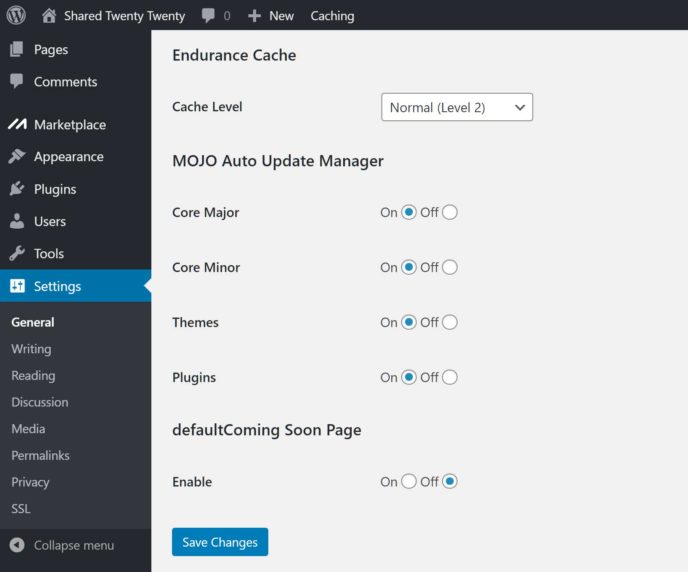
Although some of these extra plugins could be considered bloatware, WPForms is a useful tool for adding contact forms to WordPress, and, if you’re looking for a premium theme for your website, you can browse the options available at the MOJO Marketplace in your WordPress dashboard. You can easily deactivate and delete these plugins if you don’t plan to use them.
WordPress Installation Service
If you’d rather not install WordPress yourself, you can pay for HostGator to do it for you. From $99, you can have HostGator install WordPress, get a $49 theme credit, and then have HostGator install your chosen theme.
You can pay extra to have the demo content for your theme set up and a few extra website-setup tasks completed, too.
However, as the QuickInstall and Softaculous are both very straightforward, paying for this service shouldn’t be necessary for most people.
Instant Backups
All of the HostGator shared plans give you the ability to create a backup of your cPanel account at any time. As your cPanel account includes all of the details of your account, including any email addresses you’ve set up, files you’ve uploaded and your WordPress website, this is one way to back up your site.
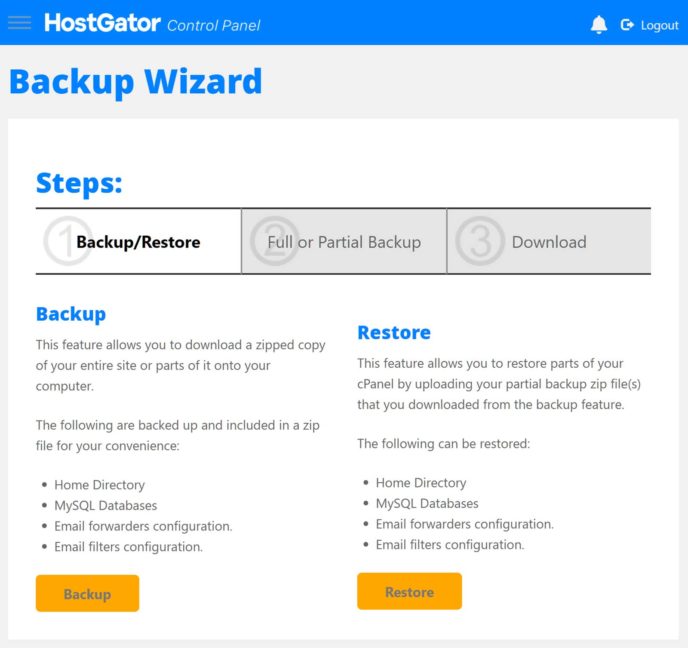
As well as doing a full cPanel backup, you can also individually back up the home directory, the MySQL databases and the email configurations from inside your HostGator account dashboard.
However, if you’d like to back up your WordPress website on its own, separately from all of your other HostGator account details, one option is to add CodeGuard to your account for an extra monthly or yearly fee. Another option is to install a third-party backup plugin, such as the free-to-use UpdraftPlus or the premium VaultPress.
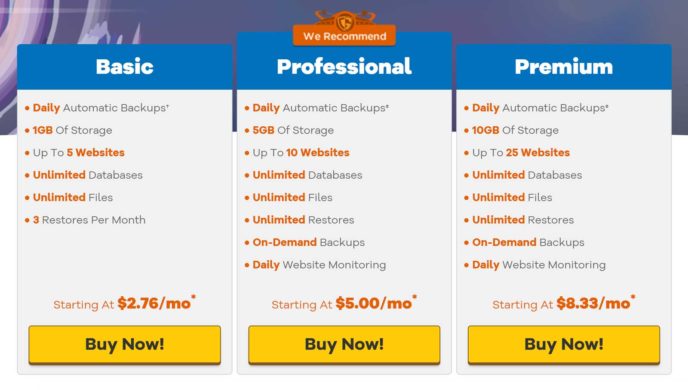
Using CodeGuard — or another backup service or plugin, such as VaultPress — gives you more options when creating backups, such as the ability to back up just the WordPress database or the website files as well. It also makes it more convenient to restore your website should something go wrong. You’ll also be able to enable automatic daily WordPress website backups and store your backup files offsite for safekeeping.
As mentioned earlier, CodeGuard is included on the slightly more expensive HostGator WordPress hosting plans at no extra cost.
Multichannel 24/7/365 Support
Impressively, all of the HostGator shared plans include 24/7/365 access to the support staff, and, unlike some other hosts, support can be contacted via telephone, live chat and email.
Hosts that offer comparatively limited support channel options on their similarly priced shared plans include Bluehost (live chat and telephone only) and DreamHost (24/7 email and office hours live chat). Although, as seen in our review of SiteGround, this host also offers 24/7 live chat, email and telephone support.
Even some more expensive premium managed WordPress hosts, such as Kinsta (chat and email support only) and WP Engine (chat support only on the entry-level plan), don’t match HostGator and their three-channel 24/7 support provisions.
During testing for this review, the live chat channel support and staff were responsive and helpful. Therefore, if you’d like to be able to contact the support staff via these three channels at any time of the day or night, HostGator would be a good option.
Not Just WordPress Hosting
Unlike managed WordPress hosting and other types of WordPress-only hosting services, with the HostGator shared plans (and many other shared hosting providers), you’re free to create websites using a range of software — not just WordPress.
The Softaculous and QuickInstallers you get access to with HostGator shared hosting make it very easy to install a wide range of software for creating blogs, websites, forums, ecommerce stores and much more.
You can also upload your own HTML, CSS and other files to your web space if you’d like, to build your own custom website. As the shared accounts include SFTP access to your server and an online file manager, getting your files online is very straightforward.
HostGator Optional Paid Add-Ons
That about covers the main features of the shared HostGator plans. However, there are a few paid add-ons that are available.
SiteLock Security Add-on
One of the available add-ons is a subscription to SiteLock. This optional security service is available to all website owners, but HostGator customers receive a discount when adding it to their hosting plan.
Depending on which plan you choose, SiteLock will scan your website daily to look for malware and other vulnerabilities. There’s also a malware alert and removal tool to help you to recover from an attack, as well as a web application firewall that can protect your website from malicious traffic and harmful requests. SiteLock has a content delivery network (CDN) feature too, helping to speed up your website and make it more resilient to downtime.
While HostGator provide you with a secure server, a subscription to SiteLock can help you to secure your website.
As mentioned, SiteLock is included on the HostGator WordPress plans at no extra cost.
CodeGuard Backups Add-on
While the shared plans let you back up your HostGator account, it’s not quite the same as using a WordPress-focused tool to back up your website.
One such tool is CodeGuard, and, by adding this paid extra to your shared hosting plan, your website will be backed up automatically every day. You can also use the time machine feature to restore your entire site — or individual files — at the touch of a button, plus access a few other backup-related features.
Although anyone can sign up for CodeGuard, HostGator customers do get a discount.
Again, like SiteLock, CodeGuard access comes with the HostGator WordPress plans at no extra cost.
Some of the other add-ons available include G Suite, Microsoft 365 and SEO Tools. Although the shared plans include a free SSL certificate from Let’s Encrypt, you can purchase a different certificate via HostGator.
HostGator Shared Hosting Performance
So far, we’ve seen that HostGator have competitively priced shared hosting packages with unlimited storage, bandwidth and page view allowances — provided you stick to the Terms of Service.
They also make it very easy to set up and manage a WordPress website. But what levels of performance can you expect from these low-cost shared hosting plans from HostGator?
To find out, we measured the average load times of our two test sites, one running a heavyweight theme featuring video backgrounds, images and other elements, and the other using a lightweight theme configured like a basic blog.
We also monitored our test sites for downtime and tested how they performed when multiple virtual users were accessing them at the same time.
Here are our results…
HostGator Load Time Testing
To give you an idea of how fast your website might load if you sign up with one of the HostGator shared plans, we used the Pingdom service to record the speed of our two test sites. The speed of the sites was recorded every 60 minutes for seven days to give us a median average load time.
Lightweight Theme Speed Test Results
For our first test site, we installed the lightweight, free and popular Twenty Twenty WordPress theme. If you’re planning to create a simple blog using a minimal theme, these test results should give you an idea of what loading times you can expect from HostGator.

The average loading time of the blog post containing an image and some text on the test site using the lightweight Twenty Twenty theme was 1.03 seconds.
Here’s a breakdown of those loading times over the seven-day period of testing by Pingdom:
While a one-second loading time is acceptable, in general other comparatively priced shared hosts we’ve reviewed, including GoDaddy and SiteGround, have delivered faster times — although we recorded slower times in our reviews of Bluehost and DreamHost.
Heavyweight Theme Speed Test Results
If you’re going to create a more feature-rich website, perhaps for your agency or business, and you plan to use popular web design trends, such as animations, video backgrounds and sliders, then you may want to choose a theme such as the best-selling Avada. These themes tend to have a larger footprint than a more minimal theme such as Twenty Twenty, and, therefore, usually load more slowly.
As you can see, from the results below, according to Pingdom, the page being tested from our site using the Avada theme and its Agency demo had a file size of 6.45 MB, and, because of this, it was slower than the page monitored on our first test site, which had a much smaller size of 199 KB.

Here’s a breakdown of the loading times that were recorded by Pingdom for the test site using the Avada theme over the seven-day testing period:
Although the average loading time of our test site using the heavyweight theme was 1.63 seconds slower than that of our site using the lightweight theme, it still performed well compared with the other hosts we’ve tested in the same price bracket, including Bluehost and SiteGround.
However, if you do plan to use a heavyweight theme, such as Avada and one of its feature-packed demos, then you may want to consider upgrading to a managed hosting service. Based on our previous reviews, you could achieve loading times of less than a second when using hosts such as LiquidWeb, Pressable and WP Engine.
HostGator Shared versus WordPress Plans Performance
As mentioned earlier, HostGator also offers WordPress-optimized plans that claim to deliver greater performance than the shared plans that are the focus of this review.
Better performance should translate into faster loading times, so, to test this, we set up two sites on the HostGator WordPress-optimized service. Once the results were in, though, we didn’t find this to be entirely the case.
When using Pingdom to compare the loading times of two identical sites using the basic Twenty Twenty theme, the site hosted on the shared plan was actually faster than the site hosted on the WordPress plan, with an average speed of 1.03 seconds versus 1.25 seconds for the site hosted on the more expensive WordPress plan.

On the other hand, for the sites using the resource-hungry, heavyweight Avada theme, the site on the WordPress plan was faster, with an average loading time of 2.53 seconds, compared with 2.66 seconds for the site hosted on the cheaper shared plan.

If these results are representative of these two services as a whole, then you may get better performance from the more expensive WordPress plans if you’re going to create a large website with a big footprint. On the other hand, if you’ll be using a lightweight theme, you could get faster loading times on the cheaper shared plans.
Load Impact Performance Testing
As our test sites weren’t receiving any visitors, the above loading time results don’t give the full picture regarding the levels of performance a live website might experience when hosted by HostGator.
So, to provide you with more performance-related information, we also used the paid Load Impact service to simulate multiple visitors accessing our test sites. Load Impact measured the response times of our sites during the test to see how well they could handle an increasing number of virtual users.
Here are the results from Load Impact for our two test sites…
Lightweight Theme Load Impact Test Result
During the five-minute test, the number of virtual users accessing the test site increased from one to 199, and the response times were recorded by Load Impact.
For the first test, the homepage of the site using the lightweight Twenty Twenty theme was put through its paces by Load Impact:
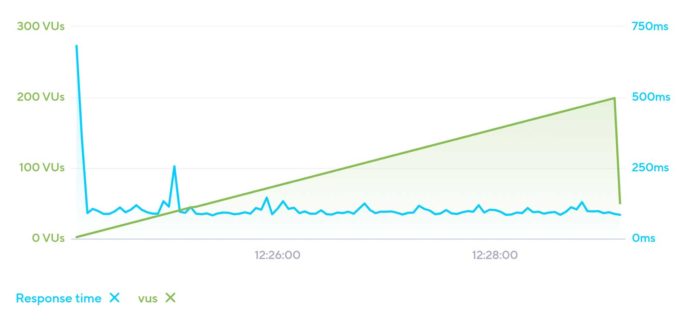
As you can see, the response time (blue line) didn’t substantially increase as the test progressed. Even when 199 virtual users (represented by the green line) were accessing the site at the same time, the response time (represented by the blue line) remained stable. This compares favorably with many of the other low-cost shared hosts we’ve reviewed so far.
Heavyweight Theme Load Impact Test Result
For the second load simulation test, the homepage of the site using the heavyweight Avada theme and its Agency demo was monitored by Load Impact.
As mentioned in the Pingdom speed test section, the file size of this page was much larger than the page of the site using the Twenty Twenty theme. This had a noticeable impact, and the first time this test was run with a maximum of 199 simultaneous virtual users, the test failed as the site became unresponsive.
Because of this, the maximum number of simultaneous virtual users was decreased to 29, and the test was run again. The chart below shows that, even with this reduced number, it didn’t take long (12 simultaneous virtual users) for the response time to rise above two seconds.
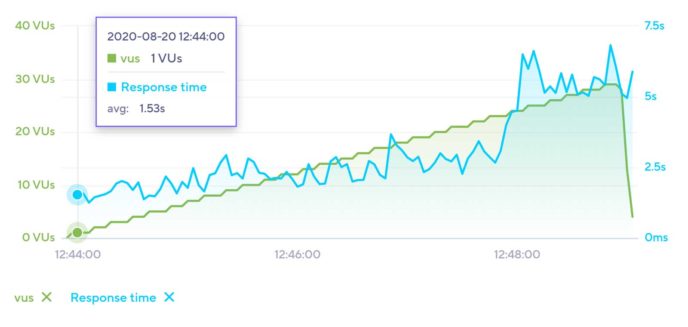
The blue line on the above chart shows that, as the number of virtual users (represented by the green line) simultaneously accessing the site increased to 29, the response time (represented by the blue line) increased to an unacceptable 6.82 seconds.
HostGator WordPress Hosting Load Impact Test Result
As the site using Avada hosted on the shared plan didn’t hold up very well, a site using Avada but hosted on the more expensive HostGator WordPress plan was also tested by Load Impact.
The maximum number of simultaneous virtual users was set to 199, but this time, unlike with the identical site hosted on the lower cost shared plan, the response time wasn’t significantly affected. Although there were a few spikes, the response time never went above an impressive 289 milliseconds.
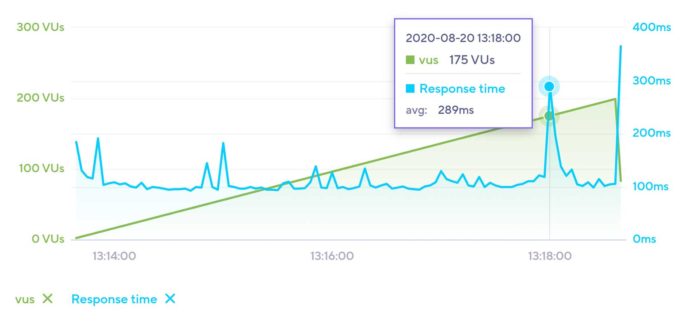
Again, this shows that if you want to use a heavyweight theme and one of its demos, you may want to think about investing in something more powerful than low-cost shared hosting.
HostGator Uptime Monitoring
Pingdom was also used to monitor the uptime rates of our test sites hosted by HostGator.
During seven days of monitoring, the two sites did experience some downtime. However, the downtime only lasted two minutes, and, therefore, the uptime percentage didn’t fall below the 99.9% guaranteed by HostGator.

Interestingly, our two sites hosted on the more expensive WordPress plan didn’t experience any downtime during the same period.

Technical Details and Other Features of HostGator Shared Hosting
While the above covers the main features of the HostGator shared hosting plans, here are some technical details you may find useful:
- Website caching: In-house Endurance Cache service with three levels of caching. Site caching is managed through your WordPress dashboard via an in-house plugin.
- Content Delivery Network (CDN): Use your own choice of CDN or purchase the SiteLock add-on for your plan.
- PHP: Ability to switch between PHP versions 7.0, 7.1, 7.2, 7.3 and 7.4 via cPanel.
- HTTP/2.0: There’s no support for HTTP/2.0 on the HostGator shared plan. You can view a list of compatible technologies here.
- SSL: Use the free Let’s Encrypt SSL certificate, import your own certificate or purchase a different certificate through HostGator.
- SFTP: Ability to create multiple Secure FTP accounts to access your webspace for uploading and editing files.
- Server file manager: Online browser-based file manager accessed via cPanel.
- Database access: Ability to access the WordPress database via phpMyAdmin through a browser.
- Email service: Email service on all HostGator shared hosting plans, including webmail, POP3 and SMTP.
- WordPress website management: Optional automatic WordPress software, theme and plugin updates.
- Plugin restrictions: No list of disallowed plugins, unlike some managed WordPress hosts.
- Security measures: SiteLock is available at a discounted rate as a paid add-on for the shared plans and includes daily malware scans, automatic malware removal and more security features.
- Post-hack clean-up services: If your site has been hacked, HostGator can perform a root cause analysis of your account for $37.50. The optional SiteLock paid add-on includes post-hack clean up services for sites that have been infected with malware or suffered other security breaches.
- Data center locations: Websites on the shared plans are hosted in the HostGator data centers in Texas, South Central USA, or Utah, Western USA.
- Staging sites: There’s no staging tool or feature on the HostGator shared plans.
- WordPress website migration: The shared plans include the free migration of one WordPress website or cPanel account to HostGator.
- Uptime checks and guarantee: HostGator monitor their servers for downtime, but don’t check the status of the sites they host. HostGator guarantee server uptime of 99.9% (which allows for around 8h 45m of downtime per year). If uptime falls below 99.9%, you may receive one month of credit for that account.
- Support channels: The support desk is staffed 24/7/365, with live chat, telephone and ticket channels available on all plans.
If you’d like to know more, you can view additional information and the main differences between the shared hosting plans on the plan comparison page of the HostGator website.
Final Thoughts
HostGator undoubtedly have some of the most affordable shared hosting plans around, especially if you manage to lock in the promotion rates for the maximum three years.
The performance is pretty good, too, compared with other shared hosts in the same price bracket. However, as our test results showed, if you plan to use a large multipurpose WordPress theme, such as Avada and one of its feature-rich demos, you may want to consider upgrading to more expensive hosting, such as a managed WordPress service, to keep your loading times in a more acceptable range.
Apart from that, though, HostGator have a lot going for them.
The lack of bandwidth, storage and visitor limits on their plans may be off-putting for some, as, no matter how unlimited the service is, your website could still end up using too many resources and get taken offline. Choosing a host that clearly states their limits, such as SiteGround, may give you more peace of mind if you’re worried about getting punished for accidentally breaking the HostGator terms of service.
It would be nice if there were a better WordPress-focused backup system in place. However, this can be easily mitigated by purchasing the CodeGuard add-on or installing your choice of free or paid WordPress backup plugin.
So, if you’re looking for affordable shared hosting without having to make many sacrifices, HostGator is a good option.
Used/using HostGator? What do you think of them? Thoughts?
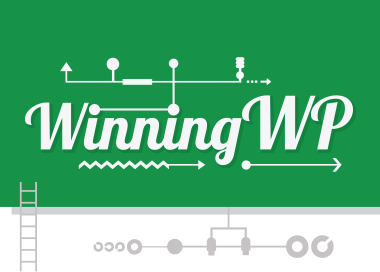
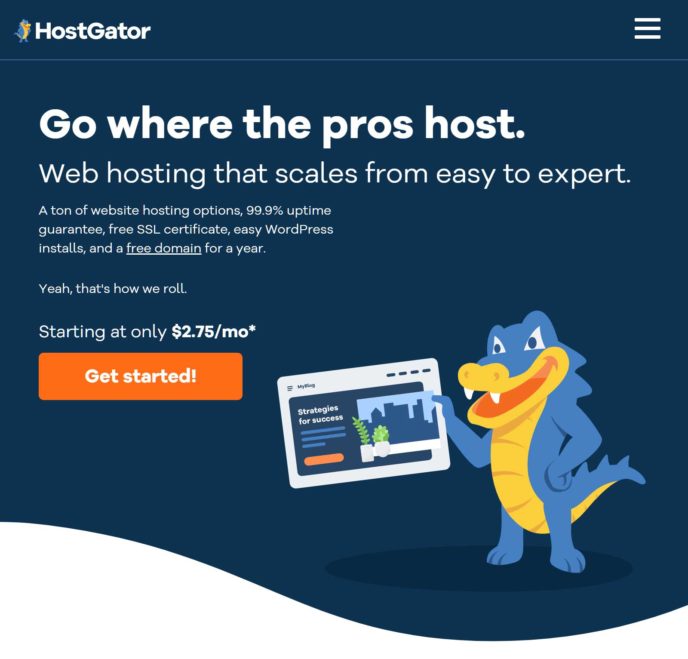
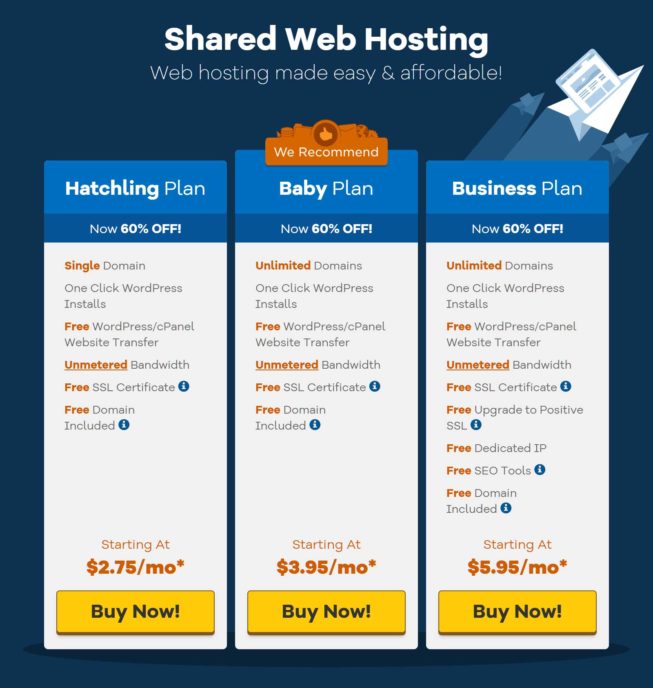
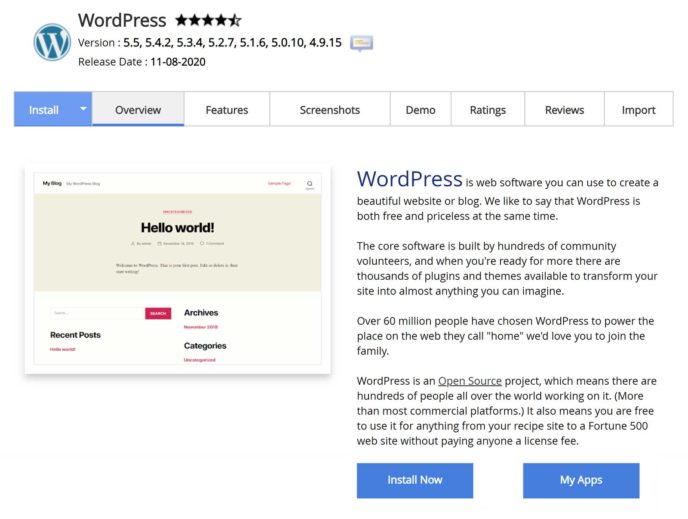

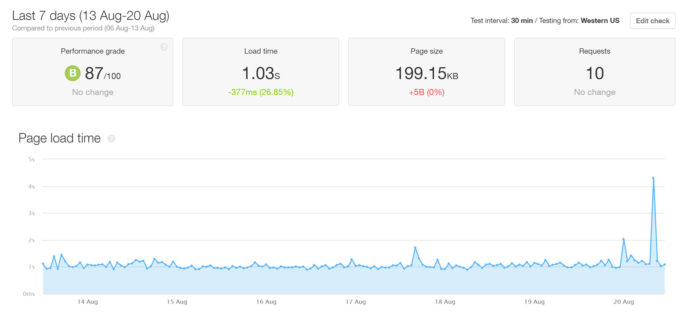
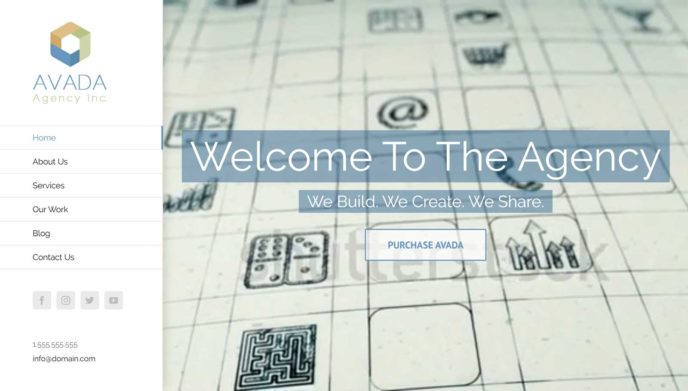
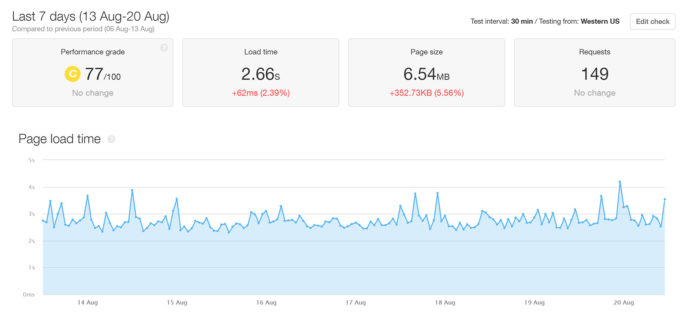
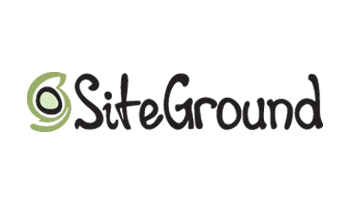
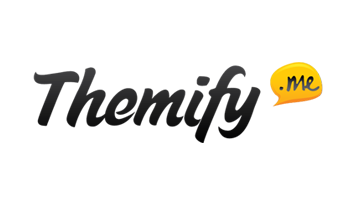
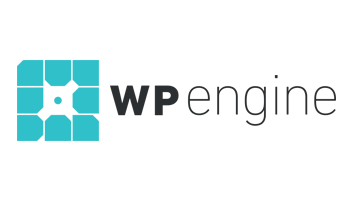
All comments are held for moderation. We'll only publish comments that are on topic and adhere to our Commenting Policy.